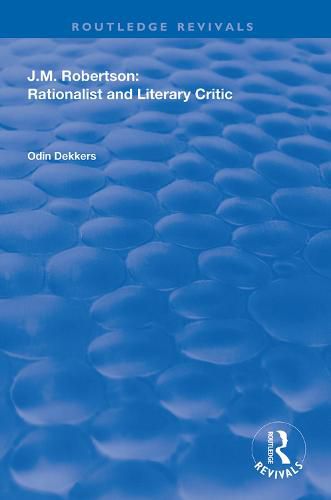Readings Newsletter
Become a Readings Member to make your shopping experience even easier.
Sign in or sign up for free!
You’re not far away from qualifying for FREE standard shipping within Australia
You’ve qualified for FREE standard shipping within Australia
The cart is loading…






Published in 1998, J. M. Robertson: Rationalist and Literary Critic is a study of the life of one of the most erudite and prolific critics of the late nineteenth and early twentieth centuries. The Scotsman John MacKinnon Robertson (1856-1933), rationalist and enemy of religion to the core, published over one hundred books and thousands of articles in fields as diverse as sociology, economics, history, anthropology, biblical criticism and literary criticism. This once widely known (and feared!) author was all too quickly forgotten after his death and his work is now seldom read. The aim of this book is to demonstrate that Robertson’s writings and in particular his acute and powerful literary criticism - much respected by T. S. Eliot - have not lost their relevance for late twentieth century readers.
Moreover, through the examinations of Robertson’s work in its contextual framework, this study provides a wide-ranging perspective on the late-Victorian literary scene, which perhaps present-day literary historians have not given the detailed attention it deserves.
$9.00 standard shipping within Australia
FREE standard shipping within Australia for orders over $100.00
Express & International shipping calculated at checkout
Published in 1998, J. M. Robertson: Rationalist and Literary Critic is a study of the life of one of the most erudite and prolific critics of the late nineteenth and early twentieth centuries. The Scotsman John MacKinnon Robertson (1856-1933), rationalist and enemy of religion to the core, published over one hundred books and thousands of articles in fields as diverse as sociology, economics, history, anthropology, biblical criticism and literary criticism. This once widely known (and feared!) author was all too quickly forgotten after his death and his work is now seldom read. The aim of this book is to demonstrate that Robertson’s writings and in particular his acute and powerful literary criticism - much respected by T. S. Eliot - have not lost their relevance for late twentieth century readers.
Moreover, through the examinations of Robertson’s work in its contextual framework, this study provides a wide-ranging perspective on the late-Victorian literary scene, which perhaps present-day literary historians have not given the detailed attention it deserves.